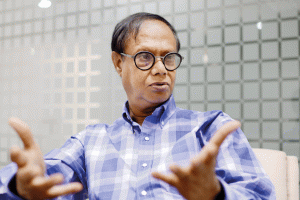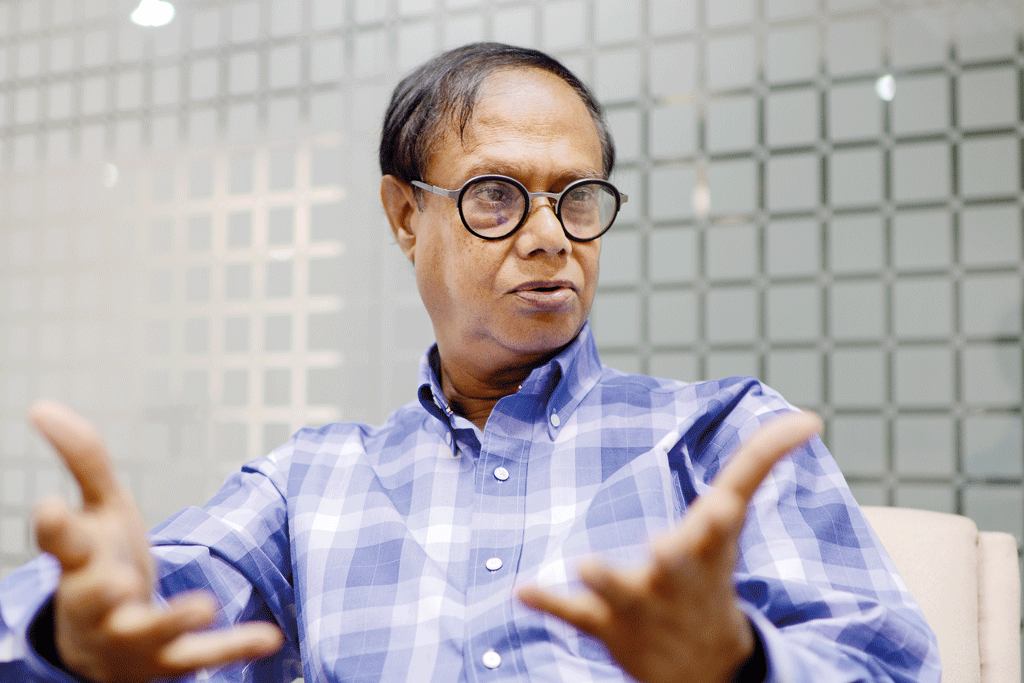‘Massive reforms in tax administration needed to augment revenue income’
- Published at 10:25 pm June 11th, 2019
 Policy Research Institute (PRI) Executive Director Ahsan H Mansur speaks to Dhaka Tribune on national budget for the fiscal year 2019-20 Mahmud Hossain Opu/Dhaka Tribune
Policy Research Institute (PRI) Executive Director Ahsan H Mansur speaks to Dhaka Tribune on national budget for the fiscal year 2019-20 Mahmud Hossain Opu/Dhaka Tribune
Bangladesh has to bring massive reforms to its revenue laws, administration, and tax structures, to increase the tax to GDP ratio and meet the increasing demands for funds to attain its goals, said Policy Research Institute (PRI) Executive Director Ahsan H Mansur, speaking with Dhaka Tribune’s Ibrahim Hossain Ovi in an interview on the national budget for fiscal year 2019-20
The government will soon announce the national budget for the fiscal year (FY) 2019-20. How can it increase revenue collection to meet the demand for funds?
The current government pledged to reduce absolute poverty, improve the quality of education and health care, and achieve the sustainable development goals (SDGs) to meet people’s expectations, when it came to power with the elections last year.
To keep its promise to citizens, the government may announce TK5 lakh crore, or Tk10 lakh crore, which is not that much important, as revenue collection is not up to the mark.
But this is unlikely due to its failure in revenue collection, which is on the decline. Everyone has admitted it and unfortunately there is no remedy available at the moment.
Like in every year, the tax to gross domestic product (GDP) ratio is the lowest in the region and with this, the country cannot achieve its development goals.
To become an upper middle income country, there need to be more public investments.
Bangladesh has to introduce and implement massive reforms in its tax, revenue, and administrative laws. Due to lack of reforms, revenue collection is gradually declining.
Why is reform needed in taxation?
In the last 10 years, no reform in the revenue collection system has been put in place, which failed to reach targets.
As a result, Bangladesh is failing to meet its revenue targets every year. There is no visible progress or steps taken in budgets, a must for increasing revenue collection.
Will multiple VAT rates help government augment revenue collection?
The way the government is implementing the value added tax (VAT) will not be a pleasant one.
The government came to an understanding with the business community where it would no longer remain as VAT. Rather, it would turn as excise duty which would not be good for the government.
The government has hinted at not increasing tax rates in the next budget. Is it possible to meet revenue targets with the existing tax rates?
Bangladesh has a high tax rate with low revenue collection. I don’t think that by increasing the tax rate, collections will increase.
Bangladesh has to strengthen its tax administration, make the tax rate flexible, and widen the tax net to increase revenue collection.
The highest individual tax rate is 25%, but it stands at 39% with various surcharges which is high in comparison to developed countries. This high tax rate is a disincentive for people to pay taxes.
The private investment to GDP ratio is hovering between 22%-23%. How can Bangladesh attract investments through budgetary policy?
It is a good time for Bangladesh to attract foreign direct investment (FDI) since foreign investors who earlier invested in China are now more willing to invest here. Even Chinese investors are showing interest in investing here. This opportunity is knocking at our door because of the US-China trade war.
In attracting investments, Bangladesh has to compete with Vietnam, India, and Cambodia. Its main focus should be to improve the investment climate and remove trade barriers.
In addition, one stop services should be fully operational, otherwise Bangladesh will not be able to meet its goals.
The government has to make ready at least five to seven special economic zones (SEZs) so that it can offer investment opportunities to both foreign and local investors.
State owned banks will likely to get Tk1,500 crore in the budget to meet their capital shortfall. Will this bring discipline to the banking sector?
For the last five years the government has been allocating a huge amount of funds every year to the state owned banking sector as recapitalization to meet their capital shortfall. It is not possible to bring discipline to the banking sector with such repeated bailouts.
It has become a tradition and providing such subsidies are not the solution. The government has to come up with measures such as privatizing some of the government banks and limiting their authority to collect deposits, since they are failing in their loan recovery.
In the case of private banks, the government has to kick out the non performing ones regardless of their political muscle and identity, since they have failed to run themselves.
The private sector banks are also not getting much by way of deposits, which are witnessing a downward trend. As a result, government revenues from the sector are down by 50%, which is not a good sign for the government.
https://www.dhakatribune.com/business/2019/06/11/massive-reforms-in-tax-administration-needed-to-augment-revenue-income






